牛津上海版(试用本)四年级下册英语Module 3 Unit 3 Days of the week period 1教学设计
沪教牛津版四年级下册英语Unit3第3课时教学课件

when our part of the earth doesn’t turn to the sun, we cannot see the sun, so
Let's read
完成句子
In the solar system(太阳系), the moon and the sun are our earth’s neighbours(邻 居). When the earth revolves around(绕……旋转)the sun, the earth rotates(自转)all the time, so we have day and night(白天和黑夜). When
important too.
( )3. When our part of the earth turns to the sun, it is the night.
( F)4. The sun is important to us, but the moon is not.
F
day
第十二页,共十四页。
第八页,共十四页。
Learn the sounds
What can you see
In the photo?
I can see Philip.
I can see Philip's toy whale
And its white tail.
第九页,共十四页。
随堂练习
判断画线部分的发音是否相同
( T )1. phone ( T )2. white
looks bright(明亮的) because it reflects(反射)sunlight. But the moon is
牛津上海版小学英语四年级下册全册教案
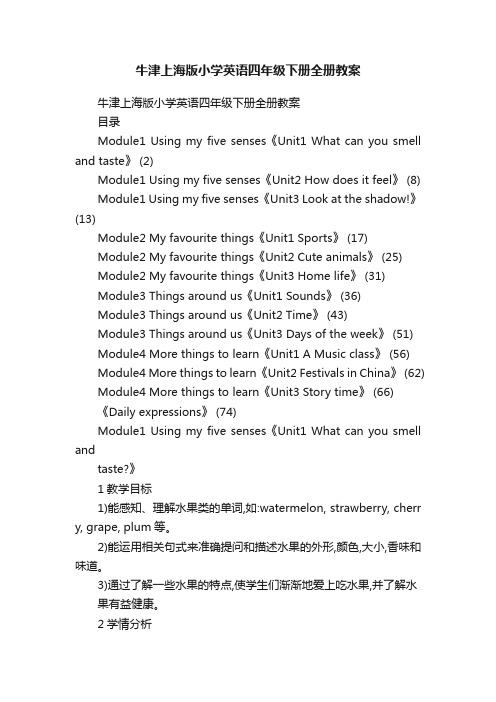
牛津上海版小学英语四年级下册全册教案牛津上海版小学英语四年级下册全册教案目录Module1 Using my five senses《Unit1 What can you smell and taste》 (2)Module1 Using my five senses《Unit2 How does it feel》 (8) Module1 Using my five senses《Unit3 Look at the shadow!》(13)Module2 My favourite things《Unit1 Sports》 (17)Module2 My favourite things《Unit2 Cute animals》 (25)Module2 My favourite things《Unit3 Home life》 (31)Module3 Things around us《Unit1 Sounds》 (36)Module3 Things around us《Unit2 Time》 (43)Module3 Things around us《Unit3 Days of the week》 (51) Module4 More things to learn《Unit1 A Music class》 (56)Module4 More things to learn《Unit2 Festivals in China》 (62) Module4 More things to learn《Unit3 Story time》 (66)《Daily expressions》 (74)Module1 Using my five senses《Unit1 What can you smell andtaste?》1教学目标1)能感知、理解水果类的单词,如:watermelon, strawberry, cherr y, grape, plum等。
牛津上海版四年级(下)《Module 3 Unit 3 Days of the week》同步练习卷(第一课时)

牛津上海版四年级下册《Module 3 Unit 3 Days of the week》同步练习卷(第一课时)一、Read and change the words(根据要求改变单词):1.(3分)1.always (同类词)2.two (序数词)3.beach (复数)4.wash (第三人称单数)5.do (第三人称单数)6.Thursday (同类词)7.get (现在分词)8.mouse (复数)9.goes (原形)10.we (宾格)二、Write the words2.(3分)Tom likes playing football.Kitty likes playing.(写出与划线部分同类的单词)3.(3分)I can smell with my nose and I can with my ears.(写出与划线部分同类的单词)4.(3分)I always busy on Monday and.(写出与划线部分同类的单词)5.(3分)We have music classes in the music room and have music shows in the.(写出与划线部分同类的单词)6.(3分)There are seven days in a week.There are months in a year.(写出与划线部分同类的单词)三、Complete the sentences(完成句子):7.(3分)At twelve o'clock,I eat rice and meat for my.8.(3分)Alice likes watching television.She TV every evening.9.(3分)Teachers' Day is on the of September.It's for teachers.10.(3分)I'm.Please give me some water,Daddy.11.(3分)is the first day of a week.四、Fill in the blanks (用所给词的适当形式填空):12.(3分)Don't(make)any noise.The little baby(sleep).13.(3分)﹣What time your teacher(go)to school?﹣﹣At seven o'clock.14.(3分)Ben(not watch)TV in the evening.He often(read)books.15.(3分)Let's do(we)homework.16.(3分)My little brother is brushing his(tooth).17.(3分)﹣What's the date today?﹣It's(two)of May.五、Choose the best answers(选出最恰当的答案):18.(3分)Kitty,is your birthday _________ Sunday?()A.in B.at C.on19.(3分)You _________ have biscuits.It's time for dinner.()A.must B.can't C.can20.(3分)Alice _________ lunch at home every day.()A.eat B.have C.has21.(3分)Look,Eddie _________ some paper ships.()A.makes B.making C.is making22.(3分)Peter goes to school _________ Monday _________ Friday.()A./,to B.from,to C.on,on23.(3分)We go home _______ half past four ______ Wednesday afternoon.()A.at,in B.on,on C.at,on六、Read and write (阅读短文,填入所缺单词,首字母已给):24.(3分)My father goes to work from (1)T to (2)S.He always very busy on (3)W.And sometimes busy on (4)F.He is busy but he is (5)h.七、Read and write (阅读短文,填入所缺单词,首字母已给):25.(3分)Jim gets up at half past six.He (1)e his breakfast at six fifty and then he goes to school.He goes to school (2)b bike.He gets (3)t school at about seven twenty every day.He (4)d like to be late.Classes begin at seven thirty﹣five.Jim (5)h lunch (6)w some other students in the school.In the afternoon,they begin classes at two o'clock and classes (7)a over at four twenty﹣five.He goes home at about five,but often he plays games in the school and gets home a little late.In the evening,he does (8)h homework.Then he often reads books.But sometimes he (9)w TV.He goes to bed (10)a about ten o'clock.牛津上海版四年级下册《Module 3 Unit 3 Days of the week》同步练习卷(第一课时)参考答案一、Read and change the words(根据要求改变单词):1.often;second;beaches;washes;does;Monday;getting;mice;go;us;二、Write the words2.basketball;3.hear;4.Tuesday;5.auditorium;6.twelve;三、Complete the sentences(完成句子):7.lunch;8.watches;9.tenth;10.thirsty;11.Sunday;四、Fill in the blanks (用所给词的适当形式填空):12.make;is sleeping;13.does;go;14.doesn't watch;reads;15.our;16.teeth;17.second;五、Choose the best answers(选出最恰当的答案):18.C;19.B;20.C;21.C;22.B;23.C;六、Read and write (阅读短文,填入所缺单词,首字母已给):24.uesday;unday;ednesday;riday;appy;七、Read and write (阅读短文,填入所缺单词,首字母已给):25.ats;y;o;oesn't;as;ith;re;is;atches;t;。
(沪教牛津版)英语四年级下册课件 Module3 unit3(1)
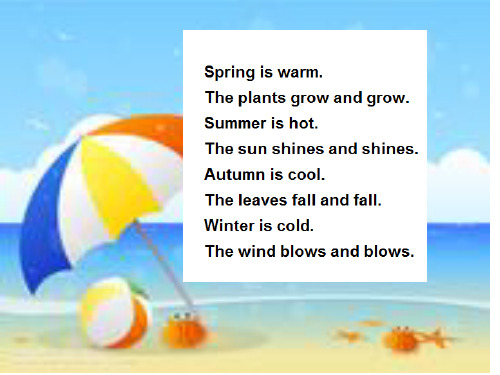
It is spring. It is sunny, rainy, warm and wet. It is summer. It is sunny, rainy, hot and wet. It is autumn. It is sunny, rainy, hot and wet. It is winter. It is cloudy,windy, cold and dry.
July 7
October 10
January 1
May 5
August 8
November 11
February 2
There are 12 months in a year. They are_____. Spring comes in March, April, and May. Summer comes in June, July, and August. Autumn comes in September,October,and November. Winter comes in December, January, and February. I like every season.
winter
winter
spring
spring
spring
summer
summer
summer
autumn
autumn
autumn
winter
season
month
spring summer autumn winterMarch 3 NhomakorabeaJune 6
September 9
December 12
April 4
Summer is red. Summer is hot. It is rainy and wet. The sun shines and shines. We can… We like…
牛津上海版(试用本)四年级下册英语Module 3 Unit 3 Story time教学设计
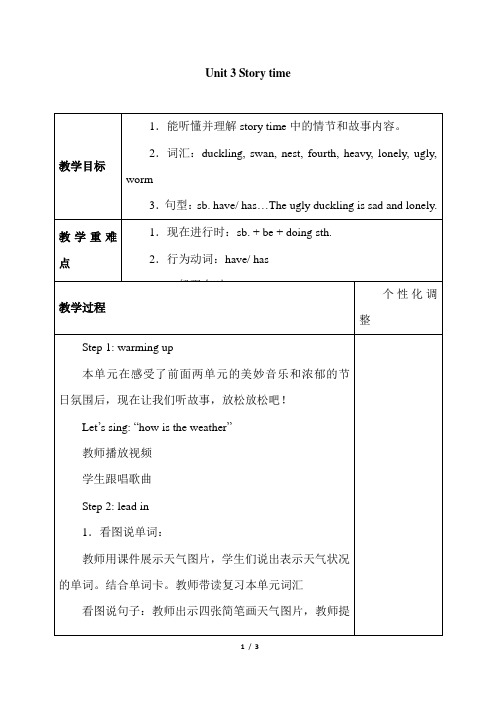
2.教师引入故事背景:zoom and zip are talking on the phone. What are they talking about?Let’s enjoy the video.播放故事视频,学生观看。
Unit 3 Story time
教学目标
1.能听懂并理解story time中的情节和故事内容。
2.词汇:duckling, swan, nest, fourth, heavy, lonely, ugly, worm
3.句型:sb.have/ has…The ugly duckling is sad and lonely.
教师播放视频
学生跟唱歌曲
Step 2: lead in
1.看图说单词:
教师用课件展示天气图片,学生们说出表示天气状况的单词。结合单词卡。教师带读复习本单元词汇
看图说句子:教师出示四张简笔画天气图片,教师提问:What’s the weather like today?引导学生回答出方位:It’s rainy/snowy/windy/cloudy.
5.教师带读对话,模仿人物的语音语调
6.学生两人一组,分角色表演故事
7.学生再次观看视频
8.学生完成导学案部分练习,教师讲评
9.教师带读板书的重点词汇和口语
Step 4: summing up/homework
总结各小组分数,Βιβλιοθήκη 评价学生课堂表现听录音15分钟,并将A.B部分的let’s learn读三遍。
学生齐读上述对话句子,复习本单元重点句型。
Step 3: presentation
四年级英语下册试题 Module3 Unit3 days of the week牛津上海版测试卷(含答案)
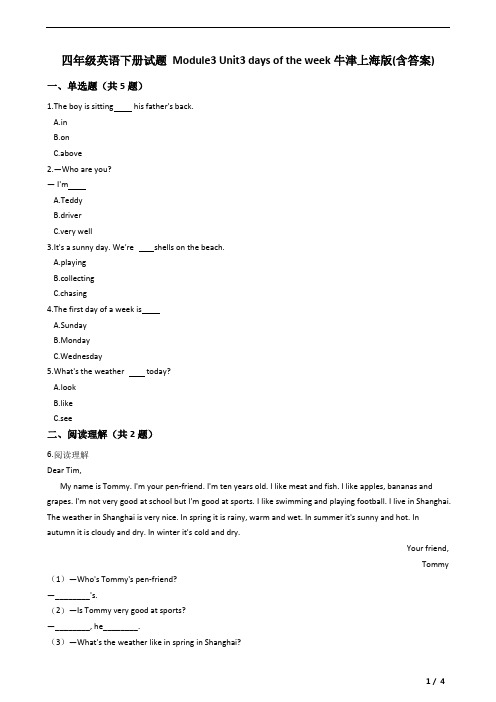
四年级英语下册试题Module3 Unit3 days of the week牛津上海版(含答案)一、单选题(共5题)1.The boy is sitting his father's back.A.inB.onC.above2.—Who are you?— I'mA.TeddyB.driverC.very well3.It's a sunny day. We're shells on the beach.A.playingB.collectingC.chasing4.The first day of a week isA.SundayB.MondayC.Wednesday5.What's the weather today?A.lookB.likeC.see二、阅读理解(共2题)6.阅读理解Dear Tim,My name is Tommy. I'm your pen-friend. I'm ten years old. I like meat and fish. I like apples, bananas and grapes. I'm not very good at school but I'm good at sports. I like swimming and playing football. I live in Shanghai. The weather in Shanghai is very nice. In spring it is rainy, warm and wet. In summer it's sunny and hot. In autumn it is cloudy and dry. In winter it's cold and dry.Your friend,Tommy (1)—Who's Tommy's pen-friend?—________'s.(2)—Is Tommy very good at sports?—________, he________.(3)—What's the weather like in spring in Shanghai?—It's________, ________and wet.(4)—How old is Tommy?—He's________.(5)—What does Tommy like?—He________ ________and________football.7.阅读理解These two girls are Li Hong and Li Ying. They are twins. They are eleven. This is their bedroom. It's a nice room. The two beds look the same. They have one desk and two chairs. Li Hong's sweater is on her bed. Li Ying's coat is on the clothes tree. Their books and pencil boxes are in the desk. Their bags are behind the chairs. The bedroom is very nice.(1)How old are Li Hong and Li Ying?(2)Where is Li Ying's coat?(3)How is the bedroom?(4)Where are the books and pencil boxes?三、句型转换(共3题)8.The boy is talking. (对划线部分提问)________ is the boy________?9.Danny goes to school at seven o'clock in the morning. (对划线部分提问)________ ________Danny________to school in the morning?10.Kitty isn't swimming in the pool. (改成祈使句)Kitty,________ ________in the pool.答案部分第 1 题:【答案】B【考点】介词辨析【解析】【分析】句意:这位男孩正坐在他爸爸的背.....。
新版牛津上海版(深圳用)四年级英语下册Unit3(第3课时)公开课课件
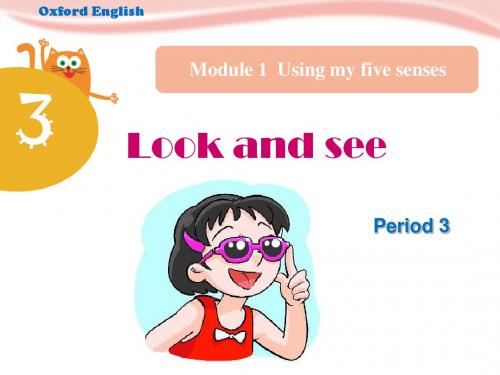
Henry is afraid. Henry runs. The black shape runs too. Henry stops. The black shape stops too.
Henry likes his new friend.
Let’s … together!
Read and complete
What’s that? Is it a big black dog?
He sees a black shape behind him.
Look and learn
shapes
Henry is afraid.
Henry runs. The black shape runs too.
Oh,you’re my shadow!
Oxford English
3
Module 1 Using my five senses
Look and see
Period 3
Look and say
again sky
moon night
high rise evening
noon
Humf and his father
Where is Humf? What does Humf do ?
he his him
Henry likes to take a walk with _____ his brother. Henry is quite helpful. ____ him His friends all like _____. him , so ____ Henry thinks the black shape wants to eat ____ he runs off.
牛津上海版(深圳用)四年级英语下册Unit3、Look、and、see课件2

Look and think
Why does the shadow change?
Let’s play
• A tree/a plant • A Flashlight or a torch
Look at my shadow!
When is it? It’s in the morning.
How is the weather? It’s sunny.
1. Copy the words below. evening night moon
2. Read the passage on page 10 twice.
3. Sing the song on page 11.
4. Complete Workbook 4B pages 14 and 17.
Oxford English
3
Module 1 Using my five senses
Look and see
Period 2
Let’s guess
It is black. It always follows you. You can see it in the daytime, but not at night.
How does the shadow change?
The sun rises in the morning.
The shadow is long.
sun is high in the sky.
The shadow is short.
The sun goes down in the evening.
Read and choose
in the morning at noon in the evening
牛津上海版四年级下册《 Unit 3 Days of the week》 同步练习卷(第三课时)

牛津上海版四年级下册《Module 3 Unit 3 Days of the week》小学英语-有答案-同步练习卷(第三课时)一、Look and choose (找出一个划线部分与其他单词发音不同的词):1. 找出一个划线部分与其他单词发音不同的词()A.g iraffeB.g irlC.g ateD.fro g2. 找出一个划线部分与其他单词发音不同的词()A.w ee kB.n e verC.r ea dD.l ea ve3. 找出一个划线部分与其他单词发音不同的词()A.u suallyB.S u ndayC.cl u bD.u p4. 找出一个划线部分与其他单词发音不同的词()A.f a milyB.h a ppyC.S a turdayD.f a ther5. 找出一个划线部分与其他单词发音不同的词()A.Th ursdayB.th ingC.wi thD.fif th二、 Read and write(写出与画线部分同类的单词):I like having an ________ class and________.Do you go to the library on ________ or________.My birthday is on the ________ of May. My brother's on the________ of June.I usually play ________ and________ with my friends on Sunday..Danny's parents want to have some ________ and________.三、Fill in the blanks (选择合适的词填空):to, on, at, with, from, in(1). Peter always plays basketball________ his classmates________ Tuesday afternoon.(2).________ weekends, my family sometimes go to Century Park.(3). We have a music class________ the music room.(4). I go to school________ Monday________ Friday.四、Fill in the blanks (用所给词的适当形式填空):Tom is Sunday. Let________(we) make a cake.National Day is on the________(one) of the October.The Lis always________(have) a holiday on the beach on Sundays. But now they________(have) a picnic in the park.How________ your mother________(go) to work every morning?My cousin often________(watch) TV on Saturday evening.How________(many) milk is there in the bottle?Our English teacher________(have) got many________(dress).﹣What________ Peter________(want) for his birthday?﹣﹣He________(want) a toy car.五、Choose the best answers (选出最恰当的答案):Look, Eddie _________ some paper ships.()A.makesB.makingC.is making_________ is the first day of the week.()A.MondayB.SundayC.SaturdayKitty, is your birthday _________ Wednesday?()A.inB.atC.onListen, the pupils _________ now. Let's _________ with them.()A.are singing, singB.singing, singC.are singing, singingI _________ home at four but Paul _________ home at five.()A.go, goB.goes, goC.go, goes﹣﹣ _________ do you do your homework?﹣At seven o'clock.()A.WhatB.What timeC.How﹣﹣Ann, are you hungry _________ thirsty?﹣I'm hungry.()A.orB.andC.butIt's five o'clock in the afternoon. Tim, ________ go to bed, please.()A.doesn'tB.don'tC.do六、Read and write (阅读短文,填入所缺单词,首字母已给):My aunt and uncle live in a coastal city. The have (1)t________ sons. One likes (2)p________ football, the other likes (3)r________. I often go to (4)v________ them in summer. My cousin often bring me to the park, the seaside and other interesting places. They teach me how to(5)s________ and play water games. We are very happy.参考答案与试题解析牛津上海版四年级下册《Module 3 Unit 3 Days of the week》小学英语-有答案-同步练习卷(第三课时)一、Look and choose (找出一个划线部分与其他单词发音不同的词):1.【答案】A【考点】国际音标Things around us: Days of the week【解析】A.长颈鹿B.girl:女孩C.gate:大门D.frog:青蛙【解答】根据题干,B、C、D三项划线辅音均发[g],而A项划线辅音发[dʒ],不同与其他三项,故选:A.2.【答案】B【考点】国际音标Things around us: Days of the week【解析】A.week:星期B.never:从不C.read:阅读D.leave:离开【解答】根据题干,A、C、D三项划线元音均为[i:],而B项划线元音为[e],不同于其他三项,故选:B.故选:B.3.【答案】A【考点】国际音标Things around us: Days of the week【解析】A.usually:常常B.Sunday:周日C.club:俱乐部D.up:向上【解答】根据题干,B、C、D三项划线元音均为[ʌ],而A项划线元音为[ju:],不同于其他三项,故选:A.故选:A.4.【答案】D【考点】国际音标Things around us: Days of the week【解析】A.family:家庭B.happy:快乐的C.Saturday:周六D.father:爸爸【解答】根据题干,A、B、C三项划线元音均为[æ],而D项father划线元音为[ɑ:],不同于其他三项,故选:D.5.【答案】C【考点】国际音标Things around us: Days of the week【解析】A.Thursday:周四B.thing:东西C.with:和…一起D.fifth:第五【解答】根据题干,A、B、D三项划线部分辅音音标均为[θ],而C项with划线辅音为[ð],不同于其他三项,故选:C.故选:C.二、 Read and write(写出与画线部分同类的单词):【答案】English,music【考点】类别分类Things around us: Days of the week【解析】我喜欢上英语课和音乐课.【解答】本题考查类别分类.English英语,是科目类名词,与之同类的单词:music(音乐).故填:music.【答案】Friday,Sunday【考点】类别分类Things around us: Days of the week【解析】你在星期五还是星期天去图书馆?【解答】本题考查类别分类.Friday星期五,是表示星期的名词,与之同类的单词:Sunday (星期天).故填:Sunday.【答案】second,first【考点】类别分类Things around us: Days of the week【解析】我的生日是在五月二号.我弟弟的生日在六月一号.【解答】本题考查类别分类.second第二,是序数词,与之同类的单词:first(第一).故填:first.【答案】badminton,football【考点】类别分类Things around us: Days of the week【解析】我通常在周日与朋友们打羽毛球和踢足球.【解答】本题考查类别分类.badminton羽毛球,是球类名词,与之同类的单词:football(足球).故填:football.【答案】milk,juice【考点】类别分类Things around us: Days of the week【解析】丹尼的父母想喝一些牛奶和果汁.【解答】本题考查类别分类.milk牛奶,是饮品类名词,与之同类的单词:juice(果汁).故填:juice.三、Fill in the blanks (选择合适的词填空):【答案】with,on,At,in,from,to【考点】选词填空Things around us: Days of the week【解析】(1)Peter总是在周二下午和同学一起打篮球.(2)在周末,我家人有时去世纪公园.(3)我们在音乐室有一节音乐课.(4)我周一到周五去上学.【解答】(1)考查介词."paly with sb"表示"和某人一起玩耍";在具体的某一天的某个时刻用介词"on".故填:with;on.(2)考查介词."在周末"用介词on.故填:on.(3)考查介词."在某间教室"用介词in.故填:in.(4)考查介词."从周一到周五"用介词短语"from…to…",故填:from;to.四、Fill in the blanks (用所给词的适当形式填空):【答案】us【考点】单词、词组Things around us: Days of the week【解析】今天是星期天,让我们做个蛋糕吧.【解答】本题考查单词填空.根据Tom is Sunday. Let﹣﹣(we) make a cake.可知这里放在let后面跟宾格形式.故填:us.【答案】first【考点】单词、词组Things around us: Days of the week【解析】国庆节在十月的第一天.【解答】本题考查单词填空.根据National Day is on the﹣﹣(one) of the October,可知这里表示几号用序数词.故填:first.has,are having【考点】单词、词组Things around us: Days of the week【解析】星期天,LIS总是在海滩上度假,但现在他们正在公园里野餐.【解答】本题考查单词填空.从always判断句子使用一般现在时,主语是单数,用has;而now用于现在进行时,构成be+Ving.故填:has,are having.【答案】does,go【考点】单词、词组Things around us: Days of the week【解析】你妈妈每天早上怎么去上班?【解答】本题考查单词填空.从 every morning判断句子使用一般现在时,主语是单数,go是实意动词,需要加助动词does,后跟动词原形go.故填:does,go.【答案】watches【考点】单词、词组Things around us: Days of the week【解析】我表兄经常在星期六晚上看电视.【解答】从often判断句子使用一般现在时,主语是单数.故填:watches.【答案】much【考点】单词、词组Things around us: Days of the week【解析】瓶子里有多少牛奶?【解答】从milk判断句子是不可数名词,询问数量用how much.故填:much.【答案】【考点】单词、词组Things around us: Days of the week【解析】我们的英语老师有很多衣服.【解答】本题考查单词填空.根据Our English teacher﹣﹣(have) got many﹣﹣(dress).可知这里have/has got表示有,主语是单数,用has,many+名词复数.故填:has,dresses.【答案】does,want,wants【考点】单词、词组Things around us: Days of the week【解析】﹣﹣彼得生日想要什么?﹣﹣他想要一辆玩具车.【解答】本题考查单词填空.根据﹣What﹣﹣ Peter﹣﹣(want) for his birthday?﹣﹣He﹣﹣(want) a toy car.可知句子叙述一件事实,时态用一般现在时,主语是单数,want 是一个实意动词,需要加助动词.故填:does,want,wants.五、Choose the best answers (选出最恰当的答案):【答案】C【考点】现在进行时,现在分词Things around us: Days of the week【解析】看,艾迪正在叠纸船.【解答】考查现在进行时."look"表示"看";用于句首,引导现在进行时.句意为"看,艾迪正在叠纸船";结构是"主语+be+doing+sth".A.makes动词三单形式,不符合题意;B.making结构错误,不符合题意;C.ia making表示"正在制作",符合题意.故选:C.【答案】B【考点】名词Things around us: Days of the week【解析】Monday星期一,Sunday星期日,Saturday星期六.该题考查名词词义辨析.Monday星期一,Sunday星期日,Saturday星期六,结合英语知识可知星期日是一周的第一天.故选:B.【答案】C【考点】介词Things around us: Days of the week【解析】凯蒂,你的生日是在星期三吗?【解答】本题考查时间介词.Wednesday星期三,在星期前面要用介词on.故选:C.【答案】A【考点】动词原形现在进行时,现在分词Things around us: Days of the week【解析】听,学生们现在正在唱歌.我们和他们一起唱吧.【解答】考查现在进行时与动词原形."listen"表示"听",用于句首,引导现在进行时;结构是"主语+be+doing+sth";"the pupils"复数形式,系动词用"are"."let's"表示"让我们",后跟动词原形sing.故选:A.【答案】C【考点】动词原形一般现在时,动词单数第三人称Things around us: Days of the week【解析】我四点回家,但保罗五点钟回家.【解答】本题考查动词形式.结合选项与题干可推测句意为"我四点回家,但保罗五点钟回家".句子强调一般事实,时态用一般现在时.主语I是第一人称,后跟动词用原形go;Paul是第三人称单数,后跟动词用第三人称单数形式goes.故选:C.【答案】B【考点】疑问词组Things around us: Days of the week【解析】你什么时间做家庭作业,在七点钟.【解答】该题考查疑问词辨析,What什么,What time什么时间,How怎样,根据答语At seven o'clock推测问句询问时间,用What time提问.故选:B.【答案】A【考点】连词Things around us: Days of the week【解析】安,你饿了还是渴了?我饿了.【解答】本题考查并列连词的用法.A.or还是,表示选择;B.and和,表示并列;C.but但是,表示转折.句意为"安,你饿了还是渴了?",由此可知横线上应填表示选择关系的连词.or通常用于否定句和疑问句中.故选:A.【答案】B【考点】祈使句Things around us: Days of the week【解析】现在是下午五点,提姆,请不要睡觉.【解答】本题考查祈使句的否定形式.根据句中关键词 go to bed,动词shout放于句子开头应是祈使句,其否定句在动词前加don't.故选:B.六、Read and write (阅读短文,填入所缺单词,首字母已给):【答案】wo,laying,unnning,isit,wim【考点】首字母填空Things around us: Days of the week【解析】我姨妈和姨父住在海滨城市.他们有两个儿子.一个儿子喜欢踢足球,另一个儿子喜欢跑步.我常常在夏天去看望他们.我堂哥常带我去公园、海滨和其他有趣的地方.他们教我怎样游泳和玩水上游戏.我们非常开心.【解答】(1)考查数词.根据原文,可知"姨妈姨父"有"两个"儿子;且首字母t已给,故第一空填:two.(2)考查动词ing."like doing sth"为固定短语,表"喜欢做某事";踢足球用短语"play football"表示;首字母p已给,故填:playing.(3)考查动词ing."like doing sth"为固定搭配,表"喜欢做某事";由于首字母是r,故填:runnning(跑步).(4)考查动词.由题,"go to do sth"为固定短语,表"去做某事";由"My aunt and uncle live in a coastal city."可知姨妈姨父住得离"我"较远,根据句意可推断"我经常去拜访他们";且因首字母是v,故填:visit(拜访).(5)考查动词.由题,"teach me how to…"表"教我做…";由"My cousin often bring me to the park,the seaside…"可知我堂哥常带我去"海边"等地,可推断"我"可能会去"游泳";由于首字母是s,故填:swim(游泳).。
牛津上海版(试用本)四年级下册英语Module 3 Unit 3 Days of the week Period 1课件

David, you _u_s_u_a_lly_ play with your deskmate in class.
No, no, no! I _so_m_e_t_i_m_e_s read loudly.
I want to be a better student.
BUT how?
You're so hardworking! FivTehsatnikckyeoursfofroryoyuoru.idea. KeeIpwtilrl ytirnyg!my best!
sometimes often always usually never
3
3
3
always
After school, I always help my mum. I always sweep the floor on Monday. I always________ on ____.
MonAfter sTcuheool, I alWweadys helpThmuy mum. Fri I always sweep the floor on Monday. I always water the plants on Tuesday. I always wash the dishes on Wednesday.
No, no, no! I ________ listen to the teacher.
David, you ______ play with your deskmate in class.
No, no, no! I ________ read loudly.
2020-2021学年牛津上海版(试用本)英语四年级下册Module3Unit3
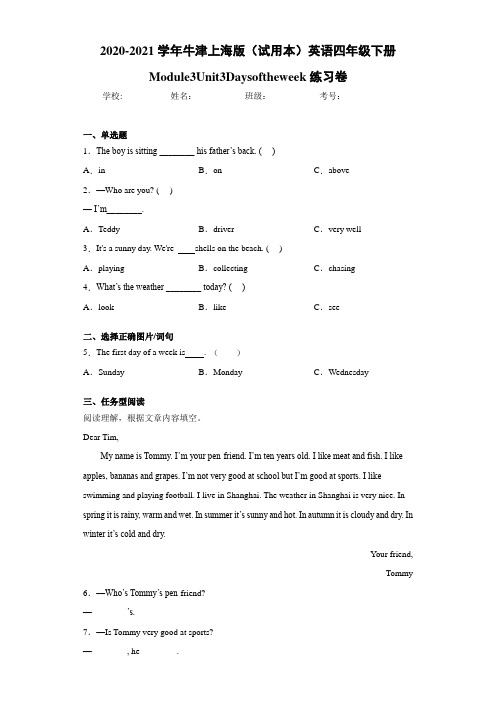
2020-2021学年牛津上海版(试用本)英语四年级下册Module3Unit3Daysoftheweek练习卷学校:___________姓名:___________班级:___________考号:___________一、单选题1.The boy is sitting ________ his father’s back. ( )A.in B.on C.above2.—Who are you? ( )—I’m________.A.Teddy B.driver C.very well3.It's a sunny day. We're shells on the beach. ( )A.playing B.collecting C.chasing4.What’s the weather ________ today? ( )A.look B.like C.see二、选择正确图片/词句5.The first day of a week is . ()A.Sunday B.Monday C.Wednesday三、任务型阅读阅读理解,根据文章内容填空。
Dear Tim,My name is Tommy. I’m your pen-friend. I’m ten years old. I like meat and fish. I like apples, bananas and grapes. I’m not very good at school but I’m good at sports. I like swimming and playing football. I live in Shanghai. The weather in Shanghai is very nice. In spring it is rainy, warm and wet. In summer it’s sunny and hot. In autumn it is cloudy and dry. In winter it’s cold and dry.Your friend,Tommy 6.—Who’s Tommy’s pen-friend?—________’s.7.—Is Tommy very good at sports?—________, he ________.8.—What’s the weather like in spring in Shanghai?—It’s ________, ________ and wet.9.—How old is Tommy?—He’s ________.10.—What does Tommy like?—He________ ________ and ________ football.阅读理解,回答问题。
- 1、下载文档前请自行甄别文档内容的完整性,平台不提供额外的编辑、内容补充、找答案等附加服务。
- 2、"仅部分预览"的文档,不可在线预览部分如存在完整性等问题,可反馈申请退款(可完整预览的文档不适用该条件!)。
- 3、如文档侵犯您的权益,请联系客服反馈,我们会尽快为您处理(人工客服工作时间:9:00-18:30)。
Teaching Plan for Oxford English (Shanghai Edition)4B M3 U3 Days of the weekBook:Oxford English (Shanghai Edition) 4B M3 U3 Days of the weekTitle: DavidPeriod: 1st period教学设计说明一、学生情况分析:基本情况:本次教学对象为四(2)班,人数为46人。
他们从一年级开始就参加学校开设的英语兴趣课程、大多数学生对课外阅读拥有浓厚兴趣、超过半数的学生在课后参加各种形式的校外英语学习等,这一切都促使他们逐渐形成了对英语学习抱有较高兴趣、较多的英语知识积累、乐于用英语进行交流的共性特点。
现有水平:在学习本单元内容之前,学生已经掌握了一周七天的星期表达,了解了不少场所以及可以进行的相关活动;同时,学生们也能较为熟练地运用to be、can句型、there be句型、一般现在时态的各种相关句型进行表达与交流。
经过过去三年半的学习,学生已经能够用一般现在时询问他人的职业,喜好等。
而学生在学习一般现在时的时候就对频度副词有了一定接触和初步认识。
本校开设的英语兴趣课中,四年级的主题是festival。
学生在学习各个节目的习俗过程中经常会碰到一类问题:What do people usually do at...(festival)? What do people often eat at...(festival)?其中也涉及到了本单元的重点---频度副词,这为本节课的学习作了良好的铺垫;同时他们也具备了一定听、说、读、写、演的能力。
学习活动:在上半学年,学生在英语兴趣课的课堂上以小组为学习单位完成了多个project如jack o’ lantern, Christmas card等。
在这个学期,学生目前接触到的节目有Easter和Mother’s Day。
在学习Mother’s Day时,学习、了解到可以在家中帮助妈妈做些什么事,如:sweep the floor, wash the dishes, set the table等,这为本节课中学生学习David的放学后生活做了准备。
教师采用对子及小组协作学习等方式,意在促进学生间的合作与学习。
现在大部分学生已开始逐步适应小组合作学习的形式,逐渐养成良好的学习策略如乐于与他人合作,共同完成学习任务,遇到问题主动向老师或同学请教,班级内逐渐形成互帮互学,共同提高的良好班级面貌。
二、模块教学任务分析:主题:Things around us单元:Unit 1 Sounds Unit 2 Time Unit 3 Days of the week4B M3的学习主题为Things around us(我们周围的事物)。
这个模块涉及到的词汇包括与声音相关的名词与形容词、频度副词、星期表达、时间类词组以及常见的日常生活类动词词组等;句型与时态包括to be句型、there be句型、一般现在时态(含各种句式)以及重点时态现在进行时态(着重于一般疑问句以及问答、特殊疑问句以及回答)。
纵观三个单元的学习内容,从以往较为形象的内容学习转到了较为抽象的、无形的事物的理解和表述上,其中包括不时不在的声音、日常生活的时间以及星期概念;同时,还涉及了频度副词的合理区分与运用、精确的时间表达与人物的言行的合理匹配以及现在进行时态所涉及的各种句式等。
可以说,学习空间更为广阔、学习内容也更加丰富多样。
通过本模块的学习,要求学生在感受声音、辨别声音的基础上猜测所发生的动作、事情或活动;通过实物展示学习与掌握时间的合理表达;通过实际生活的回归,合理表达在不同的时间段所做的事儿;通过日常生活的安排来感受与合理运用频度副词。
在此过程中,告诫学生能感受生活、观察世界,合理安排学习与生活时间,形成良好的生活与学习习惯。
三、教学目标:(一)单元教学目标【语用任务】本单元的核心人物是David,分别以David的周末、放学后、课堂生活为情境,以David 的朋友Peter的日常生活安排为情境和以David参加party为情境。
随着情境的推进,了解和掌握频度副词在不同情况下的使用。
将频度副词和一般现在时结合并加以运用,表达自己的观点;描述自己和他人的生活;掌握频度副词在一般疑问句和特殊疑问句中的运用,并能根据实际情况作答;能够并能仿写My daily life。
要求语音正确、表述达意、表达较流利,拼写和语法基本正确。
●语言知识与技能1.语音和词汇1)学习并了解-ay, -ai-的发言,尝试运用发音规律,正确拼读含有字母-ay和-ai-的新词。
2)能熟练地运用本单元核心词汇always, usually, often, sometimes, never, 并能正确书写。
2. 句法和语段1) 能熟练地将五个频度副词和一般现在时结合,运用句式At weekends, I... After school,I... In class, I...描述自己在周末、放学后和课堂上的生活。
2) 能够用What do you usually/often...do at/on...? Do you always/usually...on/at...?询问他人在某个时间做某事的频率,并能根据实际情况回答。
3)能够运用What does he/she usually/often...do at/on...? Does he/she always/usually...on/at...?询问另一个人在某个时间做某事的频率,并能根据实际情况回答。
4) 能够以第三人称,运用频度副词描述其他人的生活安排。
●语言情感1. 通过学习David在周末、放学后和课堂上的生活,了解每个人都有很多面,学会对他人作出客观评价。
2. 随着David的人物变化,感受只要努力每个人都能有进步,有志者事竟成。
同时只要努力付出就能收获快乐。
3. 通过了解Peter的生活安排,明白合理安排时间的重要性。
4.通过了解一些生活中牺牲自己的休息时间,为他人做出很多贡献的职业群的日常生活,在频度副词的对比中让学生感受到为别人带来快乐会让自己更快乐。
(二)分课时教学目标第一课时教学目标1.正确朗读并理解always, usually, often, sometimes, never 等五个频度副词,做到音、形、 义的统一;2.通过David 的周末生活,放学后的生活和课堂生活,体验频度副词在不同情境下的使用; 3.能将频度副词结合在一般现在时态的句子中加以运用,充分表达自己的观点,并描述自 己的生活;4.通过学习和体验,了解每个人都有很多面,学会对他人作出客观评价; 5. 随着情境的推进,感受只要努力每个人都能有进步,有志者事竟成。
第一课时教学重难点1. 理解always, usually, often, sometimes, never 等五个频度副词,做到音、形、 义的统一;2.能将频度副词结合在一般现在时态的句子中加以运用,充分表达自己的观点,并描述自己的生活。
个人都能有进步,有志者事竟成。
Assignment1. Listen, read and copy the five words2. Read the story fluently.3. Talk about your daily life to your friends.BoarddesignDavidHello, I am David. I’m eleven years old. I’m a schoolboy.David: At weekends, I often play sports. I often ride a bicycle on Saturday morning. I oftenplay football on Saturday afternoon. I often play badminton on Sunday morning. Sportsmake me healthy and strong. So my dad always says,”Dad:You are so active. You like sports very much.David: After school, I always help my mum. But I never study after school. I never readbooks. I never listen to English. So my mum always says,”Mum: You are so sweet, but you can be better.Kitty:David, you usually look out of the window in class.David: No, no, no! I sometimes listen to the teacher.Kitty: David, you usually play with your deskmate in class.David: No, no, no! I sometimes read loudly.Kitty: David, you usually have a daydream in class.David: No, no, no! I sometimes answer questions.Miss Fang: You’re so naughty, David! You can be better! Have a try!David: In class, I always listen to the teacher. And I never look out of the window. I alwaysread loudly. And I never play with my deskmate. I always answer questions. And I neverhave a daydream.After school, I usually study. I often read books. I often listen to English.At weekends, I sometimes have classes.Miss Fang: You’re so hardworking! Five stickers for you. Keep trying!。
